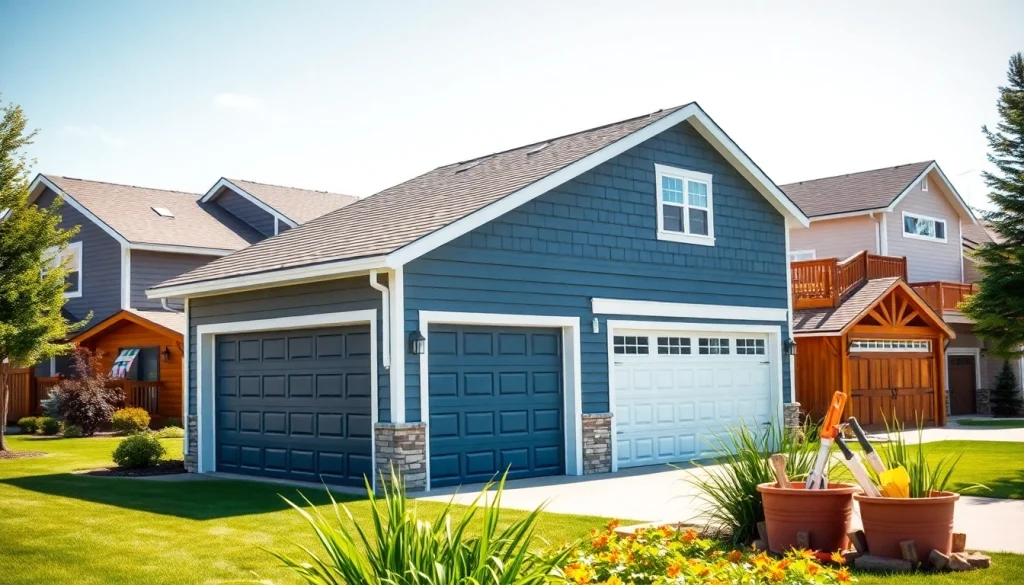Understanding Custom Built Garages
What Are Custom Built Garages?
Custom built garages are specially designed structures that cater to individual needs and preferences. Unlike standard garage options, these garages allow homeowners to tailor aspects like size, style, and functionality. Custom garages can include various configurations, such as one-car, two-car, or even multi-car designs, and can be designed to blend harmoniously with the existing architectural aesthetics of your home. They come with the freedom to select materials, layouts, and additional features, allowing homeowners to create a functional space that meets their storage and usage goals.
Benefits of Custom Built Garages
The benefits of choosing a custom built garage are multifaceted:
- Personalization: Owners can customize every detail, from door types to roofing materials and even additional features such as windows or skylights.
- Increased Property Value: A well-designed garage not only enhances functionality but can also significantly boost the resale value of a property.
- Enhanced Functionality: Customized spaces can be designed with specific functions in mind, such as workshops or storage for recreational vehicles, catering to individual lifestyles.
- Durability: Materials can be selected for their longevity and robustness, ensuring the structure withstands the test of time.
How Custom Garages Differ from Prefabricated Options
While prefabricated garages offer speedy installation and lower upfront costs, they typically lack the customization options that a custom built garage provides. Custom garages allow complete control over design and functionality, offering a tailored solution that prefabricated models simply can’t match. Moreover, custom garages integrate seamlessly with your home’s architecture, taking into account specific site conditions and zoning requirements.
Designing Your Custom Built Garage
Choosing the Right Size and Style
Determining the optimal size and style of your garage is paramount. Considerations should include:
- Vehicle Storage: How many vehicles will you store? One-car, two-car, or a larger multi-car garage may be required.
- Future Needs: Will you require additional space for equipment or hobbies that could arise in the future?
- Aesthetic Considerations: The style and design should complement your existing home, ranging from modern styles to traditional barn-like silhouettes.
Custom Features and Additions
Custom garages offer ample opportunities to add unique features. Potential additions include:
- Workshops: if you’re an avid DIYer, integrating a workspace can enhance your garage’s usability.
- Storage Solutions: Installing built-in shelves, cabinets, or pegboards can optimize organization.
- Utilities: Plumbing for sinks or heating systems make the garage more versatile, especially in colder climates.
Picking Materials and Finishes
The materials chosen for your garage not only impact its visual appeal but also its longevity. Common materials include:
- Wood: Provides a classic look, but requires maintenance to withstand weather conditions.
- Metal: Durable and low maintenance, metal garages can be built in various styles.
- Brick or Stone: These premium materials offer durability and elegance but come at a higher cost.
Cost Considerations for Custom Built Garages
Average Costs and Pricing Factors
The cost of building a custom garage can vary widely based on numerous factors:
- Size: Larger garages will naturally cost more.
- Design Complexity: Unique shapes or levels increase labor and material costs.
- Materials Used: Higher quality materials will also impact the total price.
- Geographical Location: Local construction costs and permit prices can influence the budget.
On average, building a garage ranges from $16,778 to $42,162, with factors like location, dimensions, and included features all contributing to the final figure.
Budgeting for Your Custom Garage
Planning a budget requires careful consideration. Here are some tips:
- Research Local Costs: Understand average costs in your area to set a realistic budget.
- Factor in Hidden Costs: Don’t forget about permits, inspections, and potential site preparations.
- Get Multiple Quotes: Obtain detailed estimates from different builders to compare pricing and services.
Financing Options Available
There are various financing paths available for constructing a custom garage, including:
- Home Equity Loans: Your home’s equity can be leveraged for larger projects.
- Personal Loans: Good for smaller garage projects, offering flexibility without needing collateral.
- Construction Loans: Specifically designed for building projects, often paid out in phases.
Choosing a Builder for Your Custom Garage
What to Look for in a Garage Builder
Selecting the right builder is critical to the success of your project. Look for:
- Experience: A proven track record ensures quality craftsmanship.
- Portfolio: Review past projects to assess style and quality.
- Reviews and References: Positive testimonials and references from previous clients can provide peace of mind.
Questions to Ask Before Hiring
When interviewing potential builders, consider asking:
- What is your estimated timeline for completion?
- What type of warranties do you provide?
- How do you handle unexpected costs during construction?
Understanding Contracts and Agreements
Before any work begins, ensure you understand the contract thoroughly:
- Scope of Work: Ensure all agreed-upon work is documented.
- Payment Schedule: Understand when payments are due and under what conditions.
- Termination Clauses: Know your rights if the project doesn’t proceed as planned.
Maintaining and Enhancing Your Custom Built Garage
Regular Maintenance Tips
To extend the life of your custom garage, conduct regular maintenance, such as:
- Regular Cleaning: Clear dirt, debris, and snow accumulation.
- Check Structural Integrity: Inspect for signs of wear or damage, especially after heavy storms.
- Maintain Doors and Openers: Regularly lubricate moving parts and check safety features.
Upgrading Features Over Time
As needs change, consider upgrading features to maintain your garage’s relevance. Popular upgrades include:
- Enhanced Storage Solutions: Built-in cabinets or shelving can help keep the space organized.
- Electricity and Lighting: Adding lighting fixtures or electrical outlets can enhance functionality.
- HVAC Systems: Temperature control makes for a comfortable workspace, regardless of the weather.
Ensuring Long-term Durability
To ensure your custom garage lasts, select quality materials and professional builders. Additionally, regular inspections and timely repairs can help mitigate significant issues down the line.
